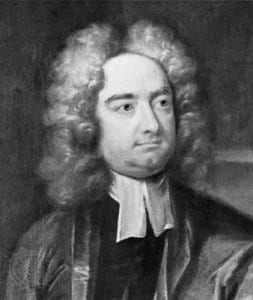Jonathan Swift
 |
| Jonathan Swift |
“I shall be like that tree, I shall die from the top.”
~Jonathan Swift
Background Information
Jonathan Swift was born on November 30, 1667 in Dublin, Ireland. His father died seven months before he was born leaving the Swift family in a difficult financial situation. At the age of four Swift’s mother sent him to live with his wealthy uncle, Godwin. Swift became a well educated man, studying at the Kilkenny Grammar School from 1674-1682. He then went on to study at Trinity College in Dublin from 1682-1689 where he received B.A. and M.A. degrees. In 1688, Swift moved to England and stayed with Sir William Temple at Moor Park where he was welcomed into the Temple household due to his mother’s relation to Lady Temple. During his stay at Moor Park, Swift taught a girl named Esther Johnson (Stella). This job turned out to be a landmark in Swift’s life. Swift returned to Ireland in 1699 after the Death of William Temple. Swift’s residence in Ireland did not stop him from making occasional trips to London, gaining fame from his essays. Stella eventually grew up and moved to Ireland in order to live closer to Swift. She also accompanied Swift on every one of his trips to London. Many believe that Stella and Swift were married in 1716. Unfortunately, Stella passed away in 1728 which had an impact on Swift for the rest of his life.
From 1707-1709 Swift was an Emissary in London for the Irish clergy. Swift attempted to begin a political career among Whigs in 1710. While this did not work out, Swift changed political parties(the Tories) and began to take over a journal called The Examiner. Soon, the Tories lost political power and this forced Swift to leave the news journal. After his political endeavors, Swift became the dean of St. Patrick’s Cathedral from 1713-1742. During this time, many believe that Swift began to suffer from a form of Alzheimer’s disease. Swift had also been struggling with deafness since he was 20. On October 19, 1745 Swift died in Ireland.
Swift wrote his own Epitaph and it said:
“Swift has sailed into his rest.
Savage indignation there
cannot lacerate his breast.
Imitate him if you dare,
world-besotted traveller.
He served human liberty.”
Swift’s Writing
Contemporary Reactions to A Modest Proposal
A Description of the Morning
A Description of a City Shower
Works Cited
1. British Literature. Volume 1c. The Restoration and the 18th Century. Page 2501.
2. Orwell, George. https://sites.udel.edu/britlitwiki/files//2018/06/Swift-1.jpg
3. http://www.kirjasto.sci.fi/jswift.htm
4. http://www.bookrags.com/Jonathan_Swift
Contributor
Diane Aiken
